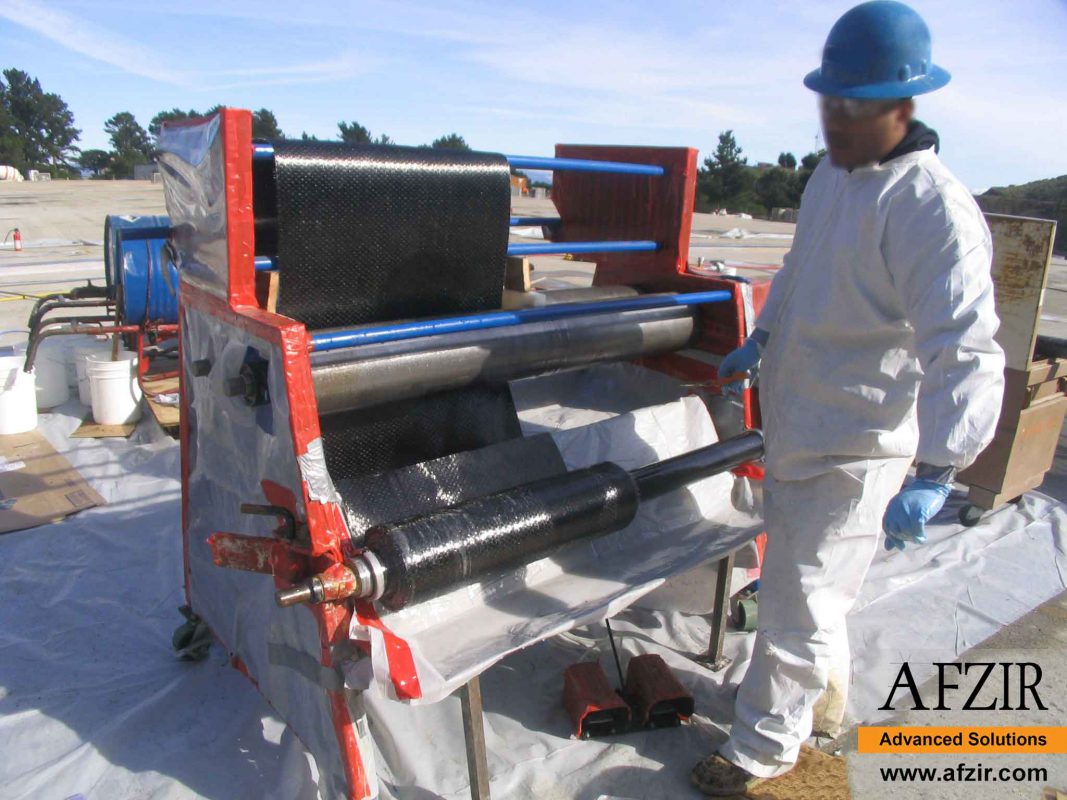Epoxy Resins of FRP Systems
Epoxy Resins are two-component materials (epoxy resin and hardener resin) with very good adhesion to various surfaces, high chemical resistance (especially in severe acid and alkaline environments), and very high tensile, compressive and flexural strength. Epoxy resin is an excellent electrical insulation material and also capable of showing thermal resistance up to 100 ° C. Epoxy resin is the mostly used resin in the FRP retrofitting industry, and after unsaturated polyester resins, it has the highest consumption in the preparation of FRP composites. Due to the high price of epoxy resin, their consumption in the manufacturing of FRP composites is low.
Nowadays, many composite materials made from carbon fiber, glass or aramid in combination with epoxy adhesives (epoxy resin and hardener) has replaced conventional metal alloys and polyester/glass composites. Epoxy adhesives are used in the manufacture of pressure vessels, high resistance members (composites made of carbon fiber and epoxy resin), bulletproof vests (aramid fiber and epoxy resin composites), aircraft industries, electrical, building and marine industries. they take. Epoxy resin has various applications such as surface coating, industrial flooring, FRP lignig repositories, tubes and composites.
Afzir company is a provider of epoxy products from German companies in Iran HSZ. Compared with most thermoset resins, the company’s products show less shrinkage due to baking (after drying). A wide range of epoxy resins and chemical products are provided by the company. Epoxy grout, epoxy based repair materials and concrete repair mortar are three well-known products of this type. The durable hardener of this company has a versatile flexibility and customized bake ability. The proper choice of epoxy resins, hardener, primer, additives and reinforcements will allow you to use this products for various applications.
Mechanical Properties of Epoxy Resin
With good mechanical properties, these resins have been practically used to make high-strength composite materials. The mechanical properties of the resin and epoxy adhesive are as follows:
Specific mass of 1000-1500 kg / m3, tensile modulus of elasticity of 3-5 GPa, ultimate tensile stress of 60-160 MPa, ultimate bending stress of 100-150 MPa, ultimate length change of 2 to 5%, shear strength of 30-50 MPa, deformation temperature under load of 290 ° C are the summarized mechanical properties of epoxy resins. The use of resin Epoxy leads to the production of high quality FRP composite material. In order to achieve the ultimate quality, there is a need for a relatively high transfer and polymerization time of about a few hours to several dozen hours at a relatively high temperature between 50 and 1000 ° C. The characteristics of epoxy resins can be summarized as follows:
Epoxy resins and adhesives are used in advanced applications such as airplane and space applications and defense applications, as well as in many composite reinforced concrete, however, it has the highest use in strengthening operations with FRP. Epoxy resins are available in various viscosities (Epoxy grout) and there are a variety of hardeners (baking or hardening agents). Epoxy resins are much more resistant than commercial polyester and vinyl esters, and that’s why epoxy resins are used to strengthen concrete structures more than others. Meanwhile, they exhibit more alkaline resistance. Epoxies are baked at temperatures up to 3000 ° C, but they need to be heated to a higher temperature to gain higher strength. Most epoxy materials typically retain the shape and dimensions of the mold. The most common material for baking epoxy adhesives is TETA Hardener or Theta hardener. The heat and time required to bake epoxy by the TETA hardener depends on the type of epoxy resin used. There is also a series of accelerator materials added to epoxy resins to increase the baking speed. It is possible to obtain a higher thermal resistance than other epoxy resins using Novalacc epoxy resin. FRP primer is needed in some cases.
Epoxy Resin Advantages
Epoxy resins have the following advantages over polyester resins:
- The mechanical properties of epoxy resin, such as tensile strength, flexural strength, compressive strength, shock resistance, creep, etc., are higher than the corresponding properties in polyester resins.
- The mechanical properties of the composite made by the epoxy resin with the TETA Hardener do not change with the raise in temperatures up to 100 degrees Celsius.
- Epoxy resin has a wide range of mechanical and physical properties that could be optimized by adding various materials such as fillers and tixothropes.
- Epoxy resins have a very small drop (less than one percent) during composite molding, and when coated with hardeners, such as hardener TETA, there is very little shrinkage.
- The resistance of the epoxy resin is very good in contact with aggressive chemicals and organic solvents.
- The adhesion of epoxy resin to concrete and steel surfaces and FRP fibers is excellent.
- Epoxy resin is able to saturate very well with different types of FRP fibers and reinforcements.
The disadvantages of epoxy resins could be listed below:
- Epoxy resin prices are more expensive than polyester resins.
- Epoxy resin hardener should be carried with caution and care should be taken when using hardener, as it may cause skin sensitivity.
- In general, epoxy resin alone is not highly ductile and is susceptible to cracking.


